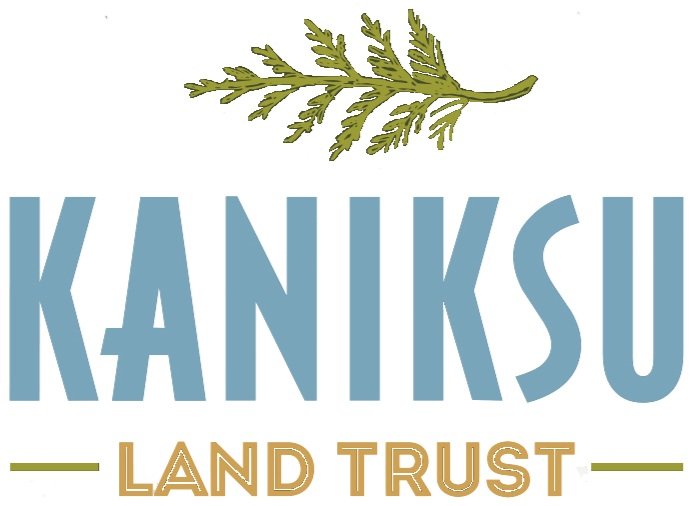KANIKSU FOLK SCHOOL SECURES DEDICATED STAFF
Hilary Petterson joins KLT staff as Kaniksu Folk School Coordinator
From the time she was born, Hilary Petterson has been steeped in a life of folk arts. Born in Prescott, Arizona, her dad worked at a folk lore center and played traditional string instruments as a hobby. Her mother ran a nature school out of their home. Raised with a solid foundation of arts and nature appreciation, the stage was set for her future career which recently took shape as Kaniksu Folk School Coordinator, a new position in KLT’s education program.
As she grew to explore nature, create natural art, and make music, she became fascinated with humanity and our unique ability to appreciate art, culture, and social connections. These early experiences drove her passion for connecting people to nature and with each other, “mixed with music,” she inserts.
Hilary has continued to pursue a life track of nature, art, music, and people. She holds a Bachelor’s Degree in Humanities and Sociology from Northern Arizona University and has studied primitive living and wilderness survival skills from nationally acclaimed instructors. She has traveled extensively teaching traditional living skills, operating her own nature-connection programs for children, and touring with various old time, folk and bluegrass bands.
When she and her husband moved to Sandpoint six years ago, she was introduced to Kaniksu Land Trust by Dave Kretchmar, KLT’s Education Director. Since then, she has worked with the organization as Camp Kaniksu staff, Kaniksu Folk School instructor, and has performed music at several KLT events. As a member of KLT staff, she will spearhead the coordination and growth of the fledgling Kaniksu Folk School that launched last spring.
“Hilary is already part of the KLT family and we are thrilled that she is joining us as a proper staff member. We are honored to have someone of her caliber to shape our new folk school with her incredible talent and skill set,” KLT Executive Director Katie Cox shared.
Kaniksu Folk School (KFS) is a nature-based educational program for adults with the purpose of enriching lives and fostering an ethic of stewardship through the sharing of traditional crafts and music. The program supports area craftspeople and artisans through paid instruction. KFS is modeled after renowned programs such as the John C. Campbell Folk School in North Carolina. Such well-established institutions employ highly sought after instructors from all over the country to guide students in crafting handmade goods from clothing and utensils to musical instruments and canoes.
In its first year, KFS has already recruited some notable instructors who have taught primitive skills regionally.
“This isn’t just arts and crafts. It’s investing in yourself with an education in basic living skills that we are losing as a culture. Having a knowledge of how to meet our basic needs makes us feel confident and happy.”
She explains that most of us would not know how to build a cell phone – an item most of us rely on every day. “But, I can carve a spoon, make basic clothing, and build a fire. I think self-sufficiency is priceless.”
She admits that folk school classes tend to be more of an investment than a typical community center art class, citing benefits of folk schools that differentiate them. Most folk school instructors have spent their entire lives curating a variety of skills and refining their craft to share with others professionally.
“It is a considerable investment to learn web design from a qualified instructor who earned a degree to teach this skill. Folk School instructors often have an even more extensive education and skill set that they share with those who want to learn.”
Unlike a skills share group or advanced coursework, KFS offers beginner-level classes, usually held during a single day or weekend at Pine Street Woods. No prior experience is necessary. In fact, students have told Petterson that a valuable byproduct of KFS is the small group instruction that gives them a chance to meet and share their learning experience with others in the community.
Petterson also appreciates the cultural connection that folk schools offer. “If you go back far enough, all of our ancestors made fire by rubbing two sticks together, had some kind of weaving, carved wood, tanned hides – whether they were from Sweden, Africa, Japan, or Canada. Learning traditional skills connects us with our shared heritage,” she said.
Hilary is currently putting the finishing touches on the fall KFS line up of classes, which she says will be slightly different from the first two seasons of KFS. She plans to integrate more regionally acclaimed folk and bluegrass musical talent with the classes and will organize a community gathering to kick off each KFS new season line up. Gatherings will include music, a skills demonstration, a seasonally-relevant participation craft, old time games (like sack races), and a pie competition. These free community gatherings will be family-friendly opportunities to discover traditional skills while enjoying nature and community.
“I really want to make this accessible,” she explained.
From an early age, Hilary’s passion for the natural world has been the thread that weaves the connection between music, art, and humanity. Her new position at KLT will be a new challenge with the familiarity of a trajectory she has pursued her entire life.
“I love the quote from Peter Drucker that says, ‘The best way to predict the future, is to create it,’” she said.




